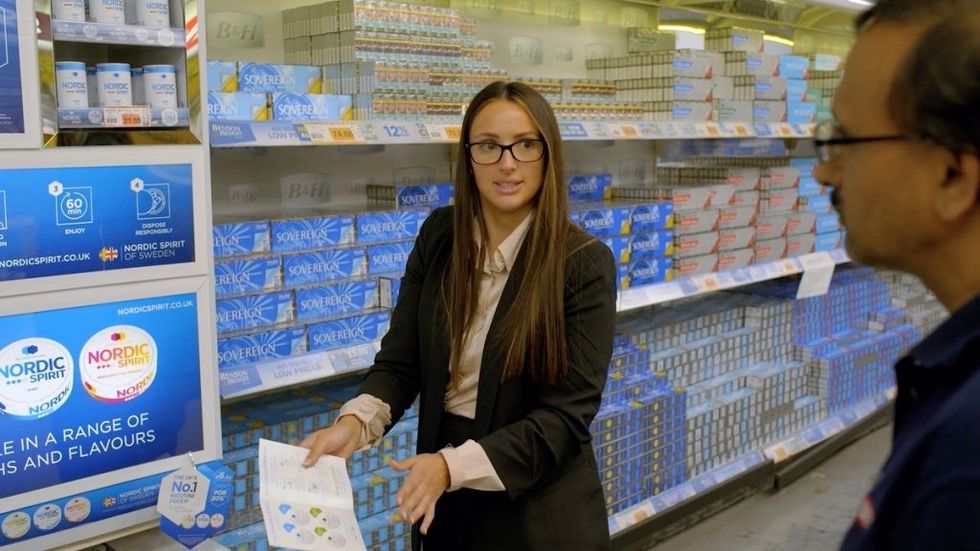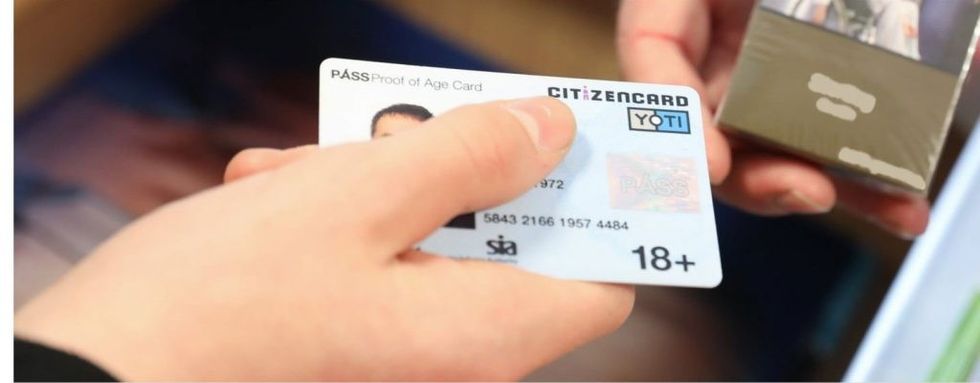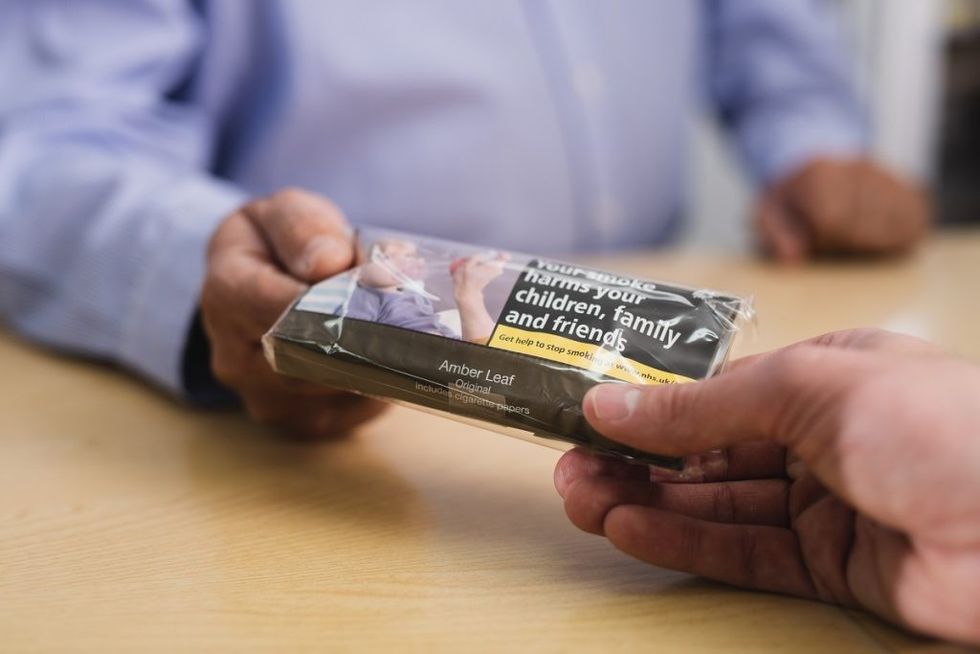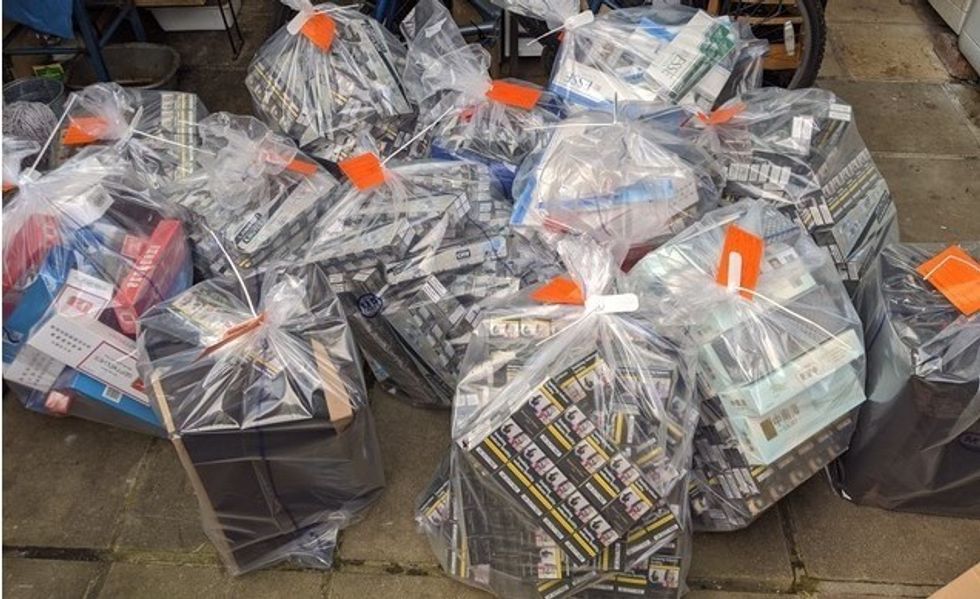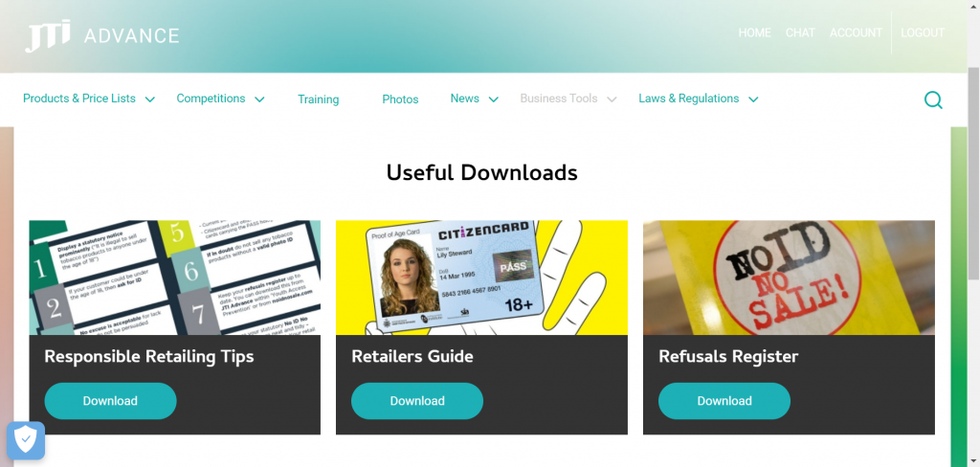Two weeks ago, while at Westminster presenting evidence to a committee of MPs, Japan Tobacco International (JTI) among other issues around illicit tobacco made what many would say was a timely call for increased powers and additional funding for Trading Standards, which badly needs better weapons to fight the ever-growing illegal tobacco and vape trade.
So Asian Trader sat down with Ian Howell of JTI, whose official title at the Weybridge – soon to be Putney – HQ is Fiscal and Regulatory Affairs Manager, good cop to Trading Standards’ bad (but not bad enough) cop, to find out what the situation in retailing is, right now.
For years JTI has stood at the forefront of the tobacco industry in seeking to limit the trade in illegal tobacco products, both fake and real-but-smuggled. JTI’s “Don’t be Complicit in Illicit” campaign – although by now more a doctrine than a campaign – has moved heaven and earth investigating evidence of illegal products and identifying rogue suppliers and retailers. “I work in the corporate affairs team,” explains Ian. "My key areas are anti-illicit trade and monitoring issues around youth access prevention.” He has been at JTI for a dozen or so years and prior to that was with the Tobacco Manufacturers’ Association for about another 15. “So I've been in tobacco as it were for quite a while,” he says. Ian is a combat veteran.
On the shop front
Backed up by its JTI Advance website, the company has tried to educate retailers in how to go about sourcing and selling tobacco and next gen nicotine products (generically “vapes") legally and – key word – responsibly.
I joke with Ian that now it appears almost impossible to see a GP face-to-face, retailers have instead been pushed to the front-line of health and made ever-more responsible for the wellbeing of the nation. New regulations concerning HFSS, coming on top of the sugar tax and decades of compulsory enforcement of age-related limits for alcohol and tobacco (and now vapes) place liability and severe penalties on the shoulders of shopkeepers. It is hard to be right but very easy to be wrong as a retailer, and the punishments can be severe. “It's odd, isn't it?” he replies. “Retailers, I guess have always been in a way like the gatekeeper.”
The fact is that every decent retailer wants to act responsibly, and Ian spends his life trying to make it easier for them to do so. His role is two-fold. On the one hand there is the work to educate and provide resources to retailers so that they can sell JTI’s products according to the law, and on the other there is the endless effort to tackle those outside the law who are smuggling, selling and producing illegal tobacco and vape products.
Sometimes the two roles overlap, such as recently in a JTI sweep that gathered evidence on 95 stores in north-west England selling illegal cigarettes, hand-rolling tobacco and vapes (the first time that vaping products were added to test-purchasing activities).
Among other things, counterfeit versions of JTI hand-rolling tobacco were discovered selling for just £4 (retail £29), with each pack costing the government £20 in taxes. That ought to get the Treasury’s attention, you would think, especially since the retailer had been actively doing it for nearly a decade. And yet since 2000, HMRC estimates such criminal trade has resulted in a tax revenue loss of £51.3 billion – about the size of the government’s current funding black hole. Ian reveals that in the last month alone, over a third of smokers have bought tobacco products that were not in the plain packs legally required in the UK.
The government, which means us, and not least the NHS, are suffering, producers are haemorrhaging profits, and retailers are caught in the middle. What can they do?
“I'm quite simple in that when it comes to what it means to be a responsible retailer, I think it's obviously sticking to the law,” Ian says.
“There are now more products and more onus on retailers to do the right thing, but it has been helped by the fact that all the ages have now moved towards 18 as the pivot point. It does provide a better framework now for consistency across the sector in all retail. So that's a small positive.”
The big negative is that abuse and violence against shop staff is on the rise – and most commonly outbursts occur when the customer’s right to purchase is questioned. We ask to see ID, they see red.
Does Ian think it would help if we had – there was a lot of kerfuffle about it when Tony Blair was in power – a simple national identity card? Show your card, you get the goods. Would that help to mitigate the violence and abuse?
“I know there can be flashpoints with retailing, and we are aware of the many stories in the press about conflicts, verbal, and also sadly, physical abuse," he says. “ID cards and the British is always a touchy subject. But with all the age-restricted products in the main now being 18, most will probably have some form of ID, so a potential flashpoint is removed. It's just that cultural obstacle of making sure everyone carries their ID wherever they go, in case they get questioned.”
But it could be just for when you want to buy something, not to get stopped on the street.
“Most people, if they're taking their wallet will have their driver's licence in the wallet with them,” Ian nods. “And obviously, also the growth of some of the digital ID cards – Yoti, and I think Citizen Card as well is looking at a digital ID which people carry on their phone.”
Put your phone there and you get your fags? Could it be as simple as that?
"It's possible. Groups such as the ACS perhaps, or NFRN, probably have more deeply-thought-out policies on this, but certainly, for what you're suggesting, it doesn't seem too outlandish.”
Ian sees the problem for retailers as one of knowledge, which influences practice. Too many varying rules are confusing, and regularising and updating should help.
“JTI has been prompting and educating over that time making sure retailers are aware of what's coming down the line,” he says, and gives a topical example.
“As you may know, while there are obviously now restrictions on vaping, which are tied to tobacco, the guidelines for nicotine pouches aren't there. We would like them to be, and we would always advocate that retailers who are selling nicotine pouches should follow the same rules that they do for selling vaping or tobacco products.”
That is not quite the same as wanting more rules for rules’ sake, however. I mention that a recent survey by ASH found – perhaps unsurprisingly – that retailers are gasping for new restrictions around tobacco, specifically an alcohol-style seller’s licence.
"The ASH paper suggested that retailers were in favour of more licensing for tobacco, but I don't know exactly how the questions were framed by ASH in that,” Ian says shrewdly. “Every responsible retailer would of course like a framework that helps them and penalises the bad guys. But did ASH ask whether retailers would be happy to pay for this licence? And again, although they did mention the fact there is the tobacco track and trace regime which requires registration, and I wouldn't say they were dismissive of it, obviously ASH’s ideal remains that there is no tobacco sold at all.”
Indeed, track and trace (in which responsibility is shared between producer, wholesaler and retailer in a closed loop) works very well, but is obviously completely ineffective against illicit goods that never enter the system in the first place. Does ASH deprecate track and trace for this reason?
“Anything they can do to put costs on people selling tobacco, they would see as a win," says Ian. But he believes that licensing, in quote marks and on a more informal level than turning up at a magistrates court for approval and payment, can work well within something like the track and trace model.
“In the modern era with online registration and form-filling, it's not like you need thousands of people sitting in offices, looking at forms, filling them in. It can be a much more straightforward process these days, it's not as onerous or expensive as an alcohol licence, which does have costs attached to it, where track and trace does not. But we believe that the framework can work very similarly to a licensing agreement.”
Crime and non-punishment
Helping good retailers is one thing; catching bad ones is another, and is where much of the effort goes as far as eliminating illicit goes. Vapes is the latest battleground, and with such high profit margins in this category – often over 50 per cent – it is a honeypot for miscreants. I wonder if the fight against illegal vapes, on top of the roaring illegal tobacco trade, isn’t a sort of King Canute affair.
“We now include test purchasing for vapes,” says Ian, pointing to the widening of the offensive. “Many of the products we have seen – and when we do test purchasing for illegal tobacco, we are buying almost without any hesitancy – are ones that have a puff count of 3500.”
Ian points out that the MHRA (Medicines and Healthcare Products Regulatory Agency), has said that 600 to 650 puffs tallies with the UK vape-tank fill limit of two millilitres of liquid.
“So these products are containing perhaps five or six times the quantity of liquid, and so they are illegal. But they are everywhere,” he says. It is the sheer extent of what can be bought cheaply and illegally that is so daunting.
“Obviously,” he continues, “the issue for any responsible manufacturer is how you can compete, because JTI will not produce products that do not comply with the law. And in the marketplace where, say, you have Logic on sale for £10, and you have an illegal vape on sale also for £10, but which offers six times the quantity of liquid, it's a very difficult market for us to look at.”
But again, that is the retailer’s responsibility for buying illicit products and selling them.
“I think part of that problem is that tobacco has been around for so long, it's ingrained," replies Ian. “It's a product that's always been there, retailers know it, they know generally how to sell it, what the rules are. Vaping is different. And perhaps a salesman coming into the shop and saying, I've got a great offer on this vape product, why don't you stock it? And particularly because the margins can be very attractive, it might be very tempting. And I know the ACS have recently put out some very good guidance, advising retailers what to look out for. And I think that's something that retailers should be aware of.”
Trading Standards is understaffed and underfunded, while the crooks and smugglers are making out like bandits – and ’twas ever thus. Hence the meeting with MPs about stiffening the ranks of Trading Standards – perhaps even with budgetary upgrades and a longer range reach of the law? The fact is that prosecutions are long and investigations (and therefore evidence) expensive to run successfully.
“Does it take one prosecution, does it take two prosecutions to change consumer behaviour? Because unfortunately, while the fact that two thirds of smokers don't buy illegal tobacco is good, what do you do about the other third?” Ian asks, perhaps rhetorically.
"They know what they're doing. There's lots of campaigns out there to persuade people not to buy illicit tobacco. You're taking money away from the taxpayers. You're encouraging criminality. But sadly, a lot of these smokers might think, well, I don't care. I've saved myself £20 on a pack of Amber Leaf.”
He says that ultimately what JTI hopes to do, as a responsible supplier, is to help retailers by providing not just a rumour of a retailer selling illegal tobacco, but actual evidence, “so that hopefully it will then direct those limited Trading Standards resources to look at somewhere where they're going to get a hit.”
And if Trading Standards could retain funds from fines it might set up a positive feedback loop and encourage more prosecutions.
He says the situation now is that “Trading Standards will walk into a shop and say, Right, we’re seizing all your illegal tobacco. But sadly, all they can do is issue a warning notice. If they could walk in and say, here’s a fine of £X-thousands, it might have a greater deterrent effect.
Ian explains that the pandemic helped, because it cut off continental imports of illegal goods, and people bought more here instead of stocking up when they travelled abroad.
"Over the last two fiscal years, the Treasury has seen about an extra £3 billion in revenue, because smokers returned to the UK High Street," he says, “not there were more smokers, or that smokers were smoking more. It's just where they were buying it from.
But that that trend is now reversing: “Obviously, if the world has opened up and we're getting back to normal, then there will be an increase in illicit trade. And as Trading Standards recently commented, they're really concerned that with the cost-of-living crisis, consumers, as I think they politely put it, may be the victim of increased levels of fraud. So we all need to be vigilant and do what we can.”
Doing well doing good
The good news is that there are resources and support for storeowners out there, and responsible suppliers such as JTI are doing all they can to help responsible retailers. I say to Ian that almost every retailer wants to be responsible because it is a very big key to success: responsible, conscientious retailers are always the most prosperous ones.
Much of the help is practical and in-store.
“For a long time now we've supported the “No ID No Sale” campaign, which is twofold,” Ian says. “The materials that come in the pack provide advice to the consumer as well as the statutory requirement with the A3 notice, and there are stickers and materials for use in the shop that builds expectation that ID will be asked for. Hopefully that reminds staff as well as consumers.”
Normalising the idea that ID is required will hopefully lessen violent confrontations, which occur when asking for proof of age is seen as an outrageous insult.
“There's also obviously guidance, which we would advise anyone to read through, about making sure you ask for ID,” he adds. “There is a refusals register in there, too. We have further advice on our website, JTI Advance. Our business advisors, our sales force, are always able to give advice as well to any retailer who has a question. And I think there's a range of good tools out there, the Business Companion site particularly, which is done by the BEIS, who have tailored advice for the four regions of the UK, because we do see differences across the regions.
It contains advice on all manner of things, not just about age-restricted products, “but also Weights and Measures and so on. It probably has most advice on most subjects that would apply to retailers, whatever they do.”
Ian stresses that the other thing to do is not be passive, and to contact Trading Standards if you have any evidence of commercial wrongdoing or suspect any products you have seen. He says it is worth doing, and will be more so if the new powers for Trading Standards come about. It might be just a dream, but being able to issue fines and keep the proceeds to invest in staff and operations could have a snowball effect on helping the fight against illicit.
"Trading Standards are there to help legitimate businesses, to assist,” he emphasises. "There is a bit of reading required and a bit of learning and reminders as well, unfortunately!”
Ian laughs, but it is true that keeping abreast of developments will benefit your business in the long run.
“Being aware of what the law requires retailers to do, however frustrating or difficult that might sometimes be, it is obviously in the retailer's interest to do that in the same way JTI sticks to any laws that apply to it.”
Retailers can report illegal trade to Trading Standards through the Citizen Advice consumer helpline on 0808 223 1133. For further support, retailers can reach out to JTI’s Customer Care line on 0800 163503 or visit JTI’s trade retailer website.
Beware tobacco price displays and don't show different ones
The excellent Business Companion website, sponsored by Dept of Business, Energy and Industrial Strategy, explains how only three types of tobacco price display are permitted: something that often trips up retailers and lands them in hot water
- Poster style lists (up to A3 in size), can be permanently on show. The legislation states that these must not exceed 1,250 cm2 (A3-sized paper falls within the legal size limit)
- A price list available on request (picture price list), which must not be left on permanent show but which can be shown to any customer who asks for information about tobacco products or smoking-related products. Good practice would suggest that age checks should be carried out before showing the picture price list and requests from children and young people under 18 should be refused
- Price labels, which can be placed on shelving, storage units or tobacco jars. One price label is permitted for each product, either on the covered shelf where the product is stored or on the front of the storage unit where the particular tobacco product or smoking-related product is held pending sale


